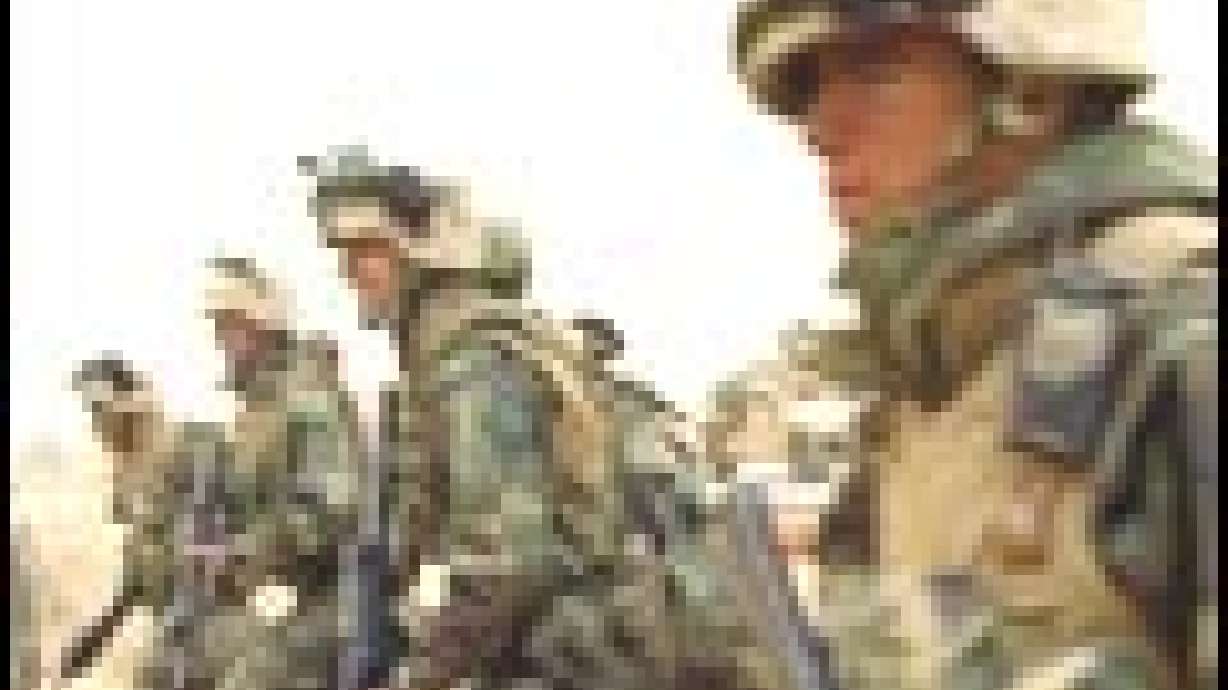Estimated read time: 3-4 minutes
This archived news story is available only for your personal, non-commercial use. Information in the story may be outdated or superseded by additional information. Reading or replaying the story in its archived form does not constitute a republication of the story.
TIKRIT, Iraq (AP) -- The U.S. Army began training an Iraqi militia force on Friday to take on civil defense duties and pave the way for U.S. forces to leave Iraq.
Fifty young men hand-picked by tribal leaders started three weeks of intensive training at one of Saddam Hussein's main palaces in the northern town of Tikrit, which is now headquarters for the 4th Infantry Division.
Lt. Col. Steve Russell said similar training programs were expected to begin in other cities across Iraq shortly.
"Our goal is that you will take our place and take over the security of your own people," Russell told recruits and tribal leaders.
"We are training you to be the leaders of a larger force that we will be creating in the coming months," he said.
The militia will start off working with U.S. soldiers in joint patrols, but eventually will be responsible for defending key infrastructure and government buildings, Russell said.
The founding members of the new militia will be paid $125 a month -- more than twice the salary of former Iraqi soldiers -- and are expected to commit to joining the civil defense force for a minimum of a year, Russell said.
The U.S. military reported two crew members of an Apache helicopter were injured 9 miles outside Tikrit when their aircraft made an emergency landing during a maintenance test flight on Thursday. Both were hospitalized in serious but stable condition, a spokesman said.
In Baghdad, the U.S. military apologized to the people of a Shiite Muslim neighborhood for an incident in which a man was killed in unrest with U.S. troops after after a Black Hawk helicopter blew down an Islamic banner.
A crowd of about 3,000 gathered after the downing of the banner and American forces said a rocket-propelled grenade was fired at them. U.S. forces returned fire, killing the attacker and four bystanders.
Lt. Gen. Ricardo Sanchez, commander of coalition forces in Iraq, apologized for the blowing down of the banner.
"Our intent is not to alienate the Shiite people," said Lt. Gen. Ricardo Sanchez, commander of coalition forces in Iraq.
"Apparently, the helicopter blew down the flag or somehow the flag was taken down, and we are taking steps to ensure that doesn't happen again," he said, answering a barrage of reporters' questions about why the Black Hawk was hovering above a communications tower.
"There is no policy on our part to fly helicopters to communication towers to take down flags," Sanchez said, insisting the banner was mistakenly blown down by the force of the helicopter blades.
Some Sadr City residents seemed calmed by the U.S. apology.
"I think that this minor incident and misunderstanding is over now. Most of the people are accepting the apology. We will not forget that it was the U.S. soldiers who liberated us from Saddam (Hussein)," said Abid Ali, an auto repair shop owner.
In the southern city of Basra, a roadside bomb killed one British soldier and wounded three others, British military spokesman Capt. Hisham Halawi said. It was the first British combat death in nearly two months.
The British casualties Thursday were all army medics traveling in an ambulance on the outskirts of Basra, where residents rioted last weekend to protest fuel shortages and power cuts.
Eight Britons have been killed in combat since May 1, when President Bush declared major combat over in Iraq. In the same period, 60 American soldiers have died in attacks.
At his weekly news conference, Sanchez also sought to emphasize that American forces were changing tactics while not altering U.S. goals of wiping out guerrilla resistance to the U.S.-led occupation.
"The conduct of our operations is to take into consideration the Iraqi culture and sensitivities, and we want to be precise in our application of combat power. We are going to continue to be aggressive, we have to be aggressive. We're fighting a low intensity conflict here," Sanchez said.
(Copyright 2003 by The Associated Press. All Rights Reserved.)








